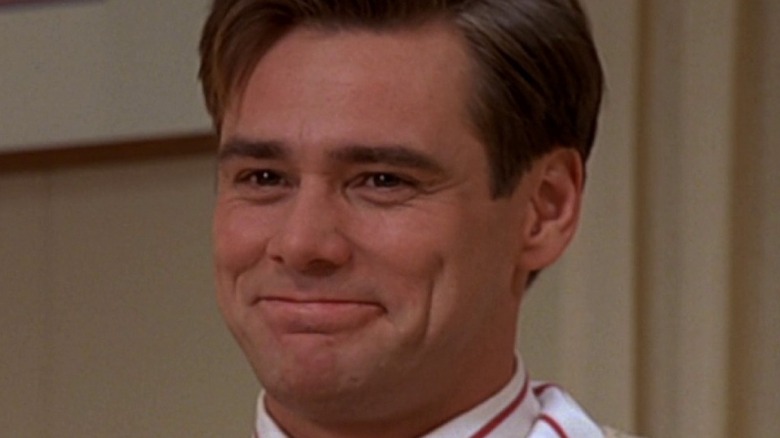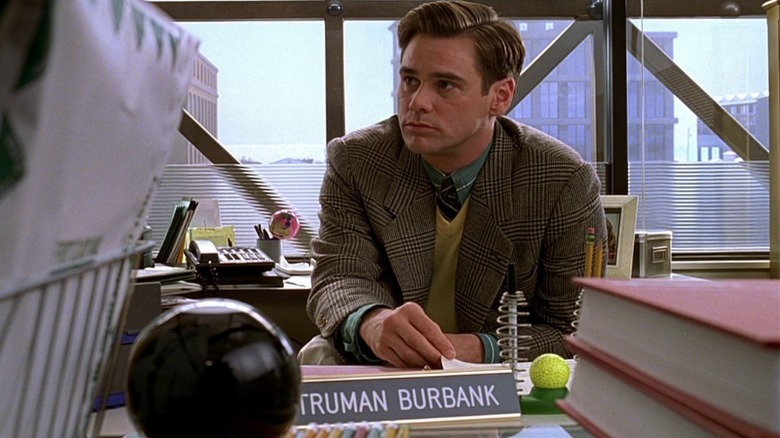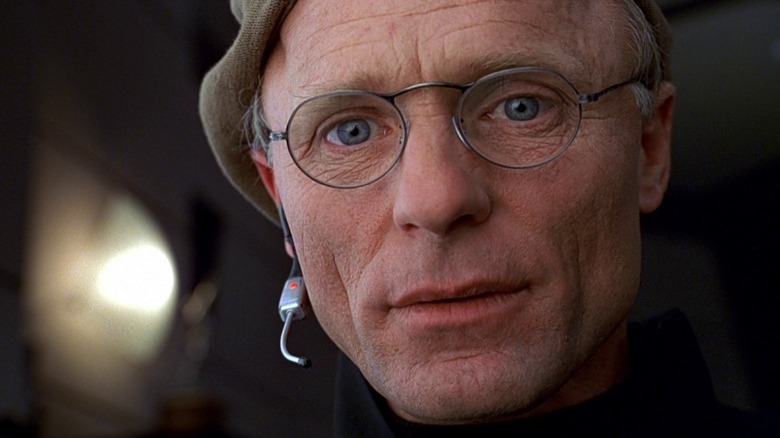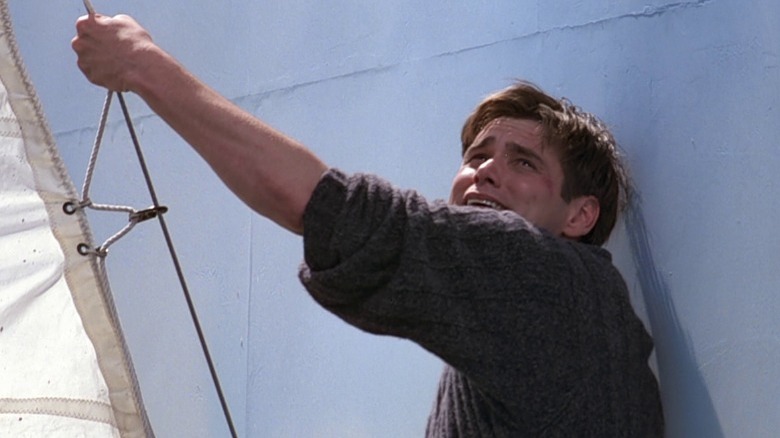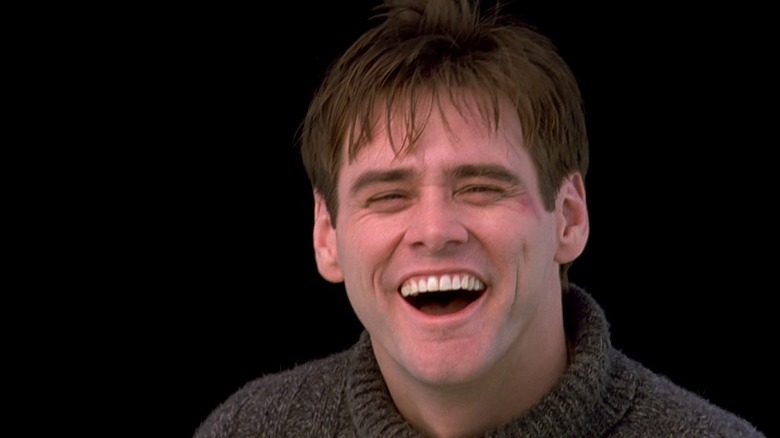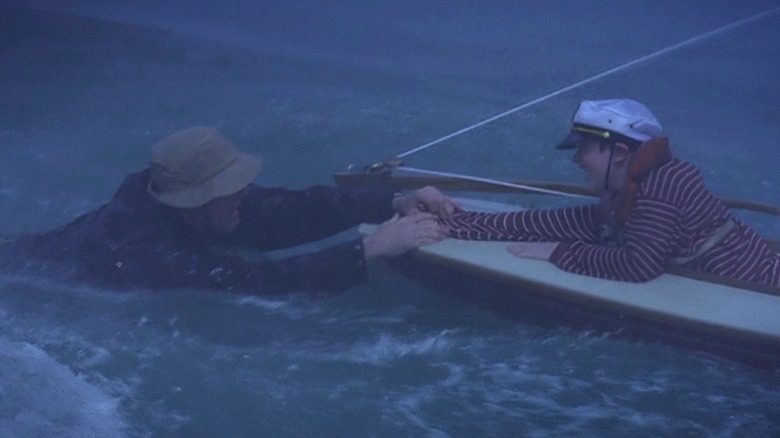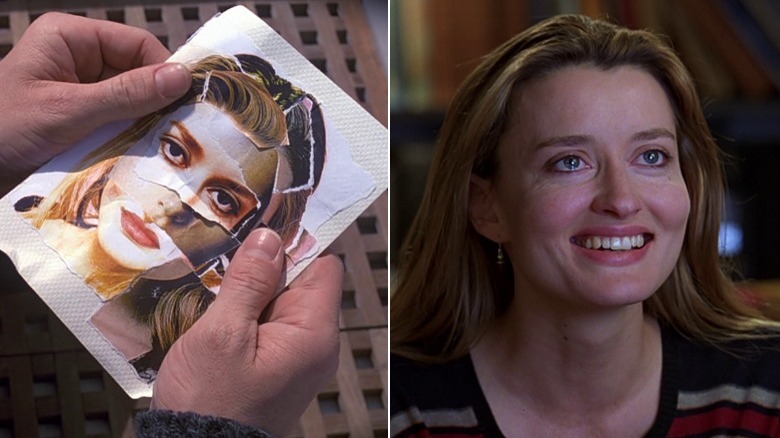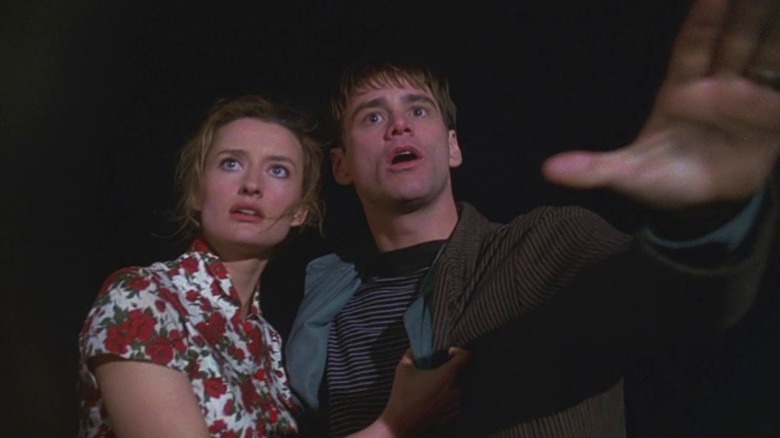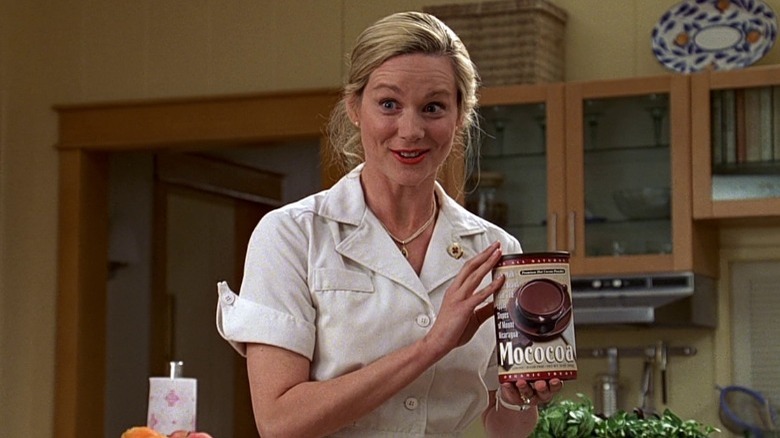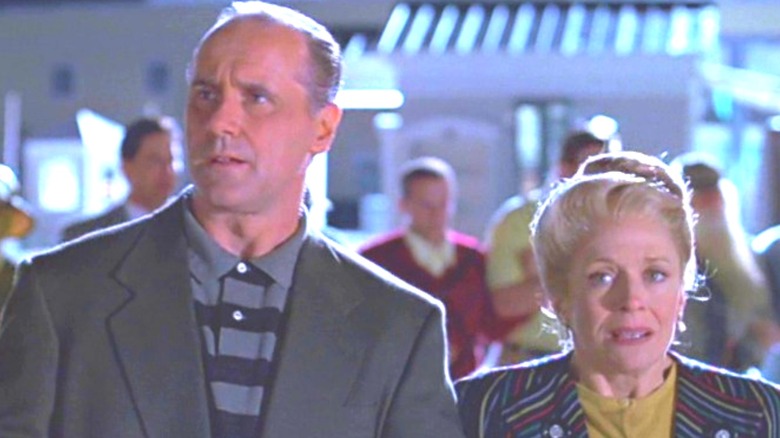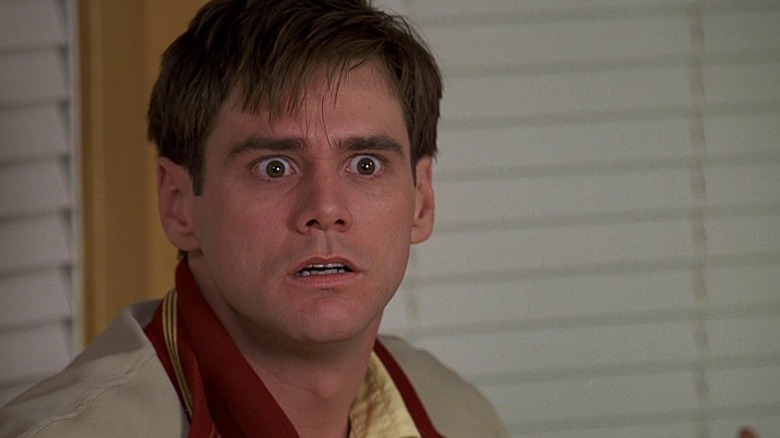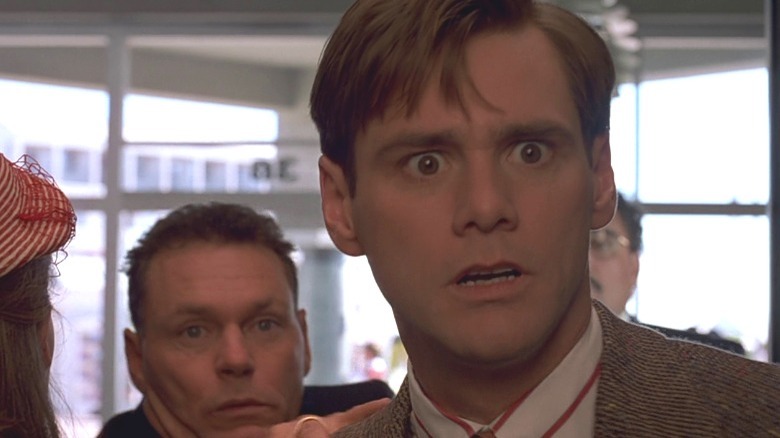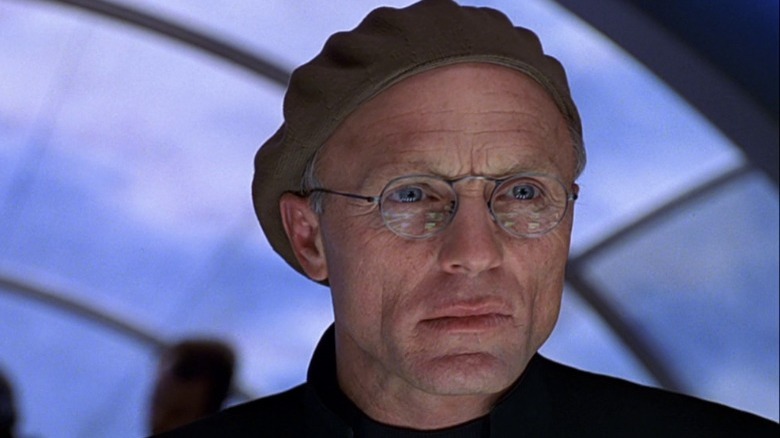The Ending Of The Truman Show Explained
Jim Carrey's portrayal as Truman Burbank in Peter Weir's 1998 drama film "The Truman Show," is one of the most complex and interesting characters he has played in his career. In the film, Carey plays Truman, a 30-year-old man living on the artificially created Seahaven Island. Yet, little does he realize, he's the subject of a TV show that follows him around 24/7, documenting his every movement and expression. Through an elaborate web of hidden cameras, paid actors, and intentional product placement, director Christof (Ed Harris) has created a completely artificial world that keeps Truman locked into a giant sound stage.
Truman was cast for the show while his mother was still pregnant with him, and he spends every second of his first 30 years on camera. Eventually, the show starts to fall apart when a series of production mishaps begin to clue Truman in that something might not be entirely as it seems. The movie, which featured a star-studded cast, won more than 40 awards following its release, including two BAFTAs, a Golden Globe, and an MTV movie award (via IMDb).
For the most part, "The Truman Show" has a pretty straightforward plot, but the ending is deliberately left ambiguous. The final scene shows Truman walking off the show's soundstage and into the darkness, but it's entirely unclear what happens next. To help fill in some of the gaps, this is the ending of "The Truman Show" explained.
It was a giant commentary on reality TV
"The Truman Show" came out in the late-'90s, right around the time when reality shows like "The Real World" were becoming enormously popular, and the movie can somewhat be seen as a commentary on those types of shows. Throughout "The Truman Show," the creator and cast members all stress how authentic and real the show is, claiming that nothing is fake and it's all organic reality. Yet, that's the complete opposite of the truth, as everything about the world is artificial and fake, from the sunlight to the relationships.
The beginning of the film has interviews from the Truman Show cast members, which are very reminiscent of the confessionals from reality TV shows. Just like in real life, the cast members are speaking about how authentic the show is, but they're doing so on a lit sound stage while preparing to go act in a TV show. While reality TV isn't quite that staged (in most cases), there is still a huge level of artificial production inserted into the shows. By showing an exaggerated version of that in "The Truman Show," director Peter Weir could have been trying to make a larger statement about the fabricated reality of "reality" TV.
The Truman Show would have been completely illegal
If you really think about it, there is no chance that any of what Christof did creating the show would have been legal. Truman Burbank was recruited for the show when he was still a fetus inside of his pregnant mother. He was an unwanted pregnancy, apparently, and he was also one of five possible babies for the show. The only reason he became the star was because he was born on the specific day the show was supposed to start airing. He then spends the next 30 years as an oblivious reality star for a show he has no idea he is on.
At no point is Truman informed about what is going on, so he is never able to formally consent or agree to be on the show. Even if his guardians were a corporation that legally had custody of him, that still wouldn't cover the massive level of personal intrusion. In addition, the production company would have needed to get Truman's consent after he turned 18, but they didn't do that either.
If Christof really did create the show and kept Truman in captivity for three decades without his consent, that would make him guilty of some serious crimes. Kidnapping and false imprisonment would be just the start of a long list of felonies. Obviously, the show was sanctioned within the movie's universe, but there's no way that would have been okay in real life.
The entire Truman Show was incredibly unethical and immoral
Putting aside any questions about the legality of a movie like "The Truman Show," the act of creating that kind of programming would be incredibly ethically and morally reprehensible. For his entire life, Truman Burbank has been filmed and watched and not allowed even a second of privacy. All of his most embarrassing moments would have been public fodder for the entire world to see whenever they wanted. On top of this, he has no idea what's going on, so he can't even try to mitigate his behavior to become more socially acceptable.
To do that to another human being would be incredibly callous and show a complete disregard and lack of respect for human life. Truman has a right to live his life in peace and independence just as any other person, so not even allowing him to decide if he wants to be on the show is a horrible transgression against Truman's rights. While he might not realize it, Truman's dignity and integrity are shredded to bits by having his most intimate and personal moments broadcast to the world.
Agreeing to participate in the show would be agreeing to basically lie to someone every day for their entire life, while also exploiting them to make money. Just being involved in a show like that would be pretty questionable.
Truman's final lines explained
When Truman Burbank finally realizes that his entire life has been a lie and that he's the unwilling character in a reality TV program, he immediately finds a way to try and sneak out and escape Seahaven Island. Christof, not wanting his investment and reality show to crumble, tries to get Truman to stay by creating a massive artificial hurricane directed at Truman's boat.
After almost killing Truman, Christof finally relents, and Truman and the creator of the show have a brief conversation, where Christof tries in vain to persuade him to stay. In response, Truman looks right at the camera and says his go-to line: "In case I don't see ya, good afternoon, good evening, and goodnight." Then, he walks out of the door and away from the show for good.
By using his generic catchphrase instead of giving a clear answer, Truman was telling Christof that he felt he no longer owed him or "The Truman Show” anything else. It was Truman's way of retaking ownership over his emotions and feelings, allowing him to determine how he wanted to live his life instead of being someone else's pawn. Truman had given the show every bit of his life and feelings over the past 30 years, and now he was finally being allowed privacy. It was a giant middle finger to Christof and the entire show.
Why the sea was so significant
As Truman Burbank starts to grow up and get older, Christof realizes that he needs to come up with new devices and schemes to stop him from wanting to leave his artificial home on Seahaven Island. Leaving would obviously be problematic for Christof, as it would completely shatter Truman's illusion of life and ruin the show.
To keep Truman from wanting to leave the island, Christof begins psychologically tormenting him by deliberately making him associate the water with negative feelings. A huge rottweiler dog starts barking at him when he gets near the boats on the docks, and for the coup de grace, Christof has Truman's father Kirk killed off in a horrible boating accident. Kirk's death causes Truman to become paralyzed with fear regarding water, to the point he can't even drive over it on a bridge –- thus artificially locking Truman inside of Seahaven as a prisoner of his own mind.
It's not until Truman realizes the truth about his life that he is finally willing to risk the sea again in order to escape. By navigating the sea and making it to the edge of the sound screen, Truman was symbolically freeing himself from his artificial imprisonment on the show. No longer was he controlled by outside forces who told him what to think and how to feel. By leaving the show through the sea, Truman was able to conquer his fears and become in charge of his own destiny.
Why Truman finally decides to leave
Truman Burbank first starts to get an inkling that something is amiss with his world when objects start falling out of the sky and his radio starts going haywire and tracking his movements. Yet, while strange incidents start to occur more and more frequently, most of them are seemingly explained away by the show as just a series of coincidences. It's not until his fake dad reappears that Truman really starts to question things. After a series of confusing incidents that seemingly confirm his suspicions of being filmed, Truman has a long conversation on the edge of an unfinished road with his lifelong friend, Louis.
It's during this conversation that Truman realizes that everything that Louis is telling him is a lie and that everyone is plotting against him. The heartbreaking realization that he can't even depend on Louis, his lifelong friend, truly devastates him and brings Truman to tears. It's following this conversation that Truman starts to plot his escape, which he executes a short time later.
Yet, before Truman can leave, he still has to complete one task: He has to finish the headshot he has been creating of Sylvia, from memory, using magazine cutouts. When Truman finally completes the picture, he decides it's time to leave Seahaven forever.
Would Truman and Sylvia have reunited?
The ending of "The Truman Show" sees the protagonist Truman Burbank finally escape the confinements of his artificial existence in Seahaven to experience the real world. The final scene has Truman walking off the soundstage while Sylvia (Natascha McElhone) is seen crying tears of joy as she excitedly runs out of her apartment. While it's not certain they would have ended up together forever, it's more than likely they would have reunited almost immediately after Truman escapes.
It's clear that both of them still harbor feelings for each other even after they were forcefully and permanently separated. Sylvia continues to watch the program after her departure, even though she abhors it, just to be able to connect with Truman vicariously. As is clear from the objects in her apartment, she is also part of a public group that opposes the show and holds protests to get it canceled. To stay close to her, Truman keeps her sweater as a memento, and he sneaks down to his basement chest and touches it from time to time as a reminder.
In addition, Truman's sustained feelings for her are confirmed by the headshot of her he is creating from magazine cutouts. He desperately wants to see Sylvia again, but the only way he can is by creating his own picture of her. It's not until Truman finishes the headshot that he feels comfortable enough to leave, proving he was still in love with her all along.
Truman probably could have sued the show for millions
One of the key things that keeps "The Truman Show" in production is the incredible use of product placements. Due to the show airing 24/7 for all 365 days of the year, it's impossible for Christof to make money through any commercials or ad revenue on the show. So instead, he sells everything that the audience sees on screen. From hats to food products and beer, everything that Truman uses is something that can be purchased. This is actually part of what leads to the show's downfall, as his wife Meryl's constant advertisements of certain products begin to make Truman suspicious of her authenticity as a person.
The exact number is not revealed, but it's said by the host of "Tru-Phone" Mike Michaelson (played by Harry Shearer) that the Truman show produces "staggering revenues." If this is true, then after Truman's escape, he surely would have been entitled to a pretty big portion of this money. Everything was sold using his likeness or with him acting as a spokesman, which would mean he would be legally entitled to part of the profits.
After escaping, Truman could have easily filed a civil lawsuit against the creators. Not only for the product revenue, but also for emotional distress and anguish. It could be pretty convincingly argued that what Christof and the show did was akin to psychological torture, and Truman definitely was entitled to some serious compensation because of it.
Don't count on any family reunions
All of the people that Truman Burbank thought he was close with, like his parents, wife, and best friends, were actually just actors getting paid to perform a role. While some of them spent their entire lives around Truman and grew up with him on TV, there was still a massive barrier between them due to the fact that they were always lying to Truman's face about everything. Even cherished childhood memories, like Louis being out of school for a month due to being sick, were manipulated and served to reinforce his artificial reality.
It's hard to imagine that once Truman left the show he would want to have anything to do with them. And considering they were just playing roles and not acting as themselves, they might not have even had anything in common with him in the real world anyways. For Truman, his former friends and family would probably just be bitter reminders of a horrible betrayal. It's doubtful he'd want to spend any time with any of them.
In addition, Truman never meets his biological parents, as he is adopted by Christof's corporation as soon as he is born. Because of that, it's impossible to know if he had any biological siblings or who his biological relatives were. It's possible he could have tried to track down the medical records, but it's likely that his only connection to his former world would be through Sylvia.
Truman probably struggled to adjust to the real world
After living his entire life in the artificial bubble of "The Truman Show," it's almost impossible that Truman Burbank's transition into the real world was anything short of traumatic. Everything about his life was constructed in a way that was harmless to him and controlled — the complete opposite of what he would experience as a free person. No longer would he be safe from people trying to do harm to him, like thieves or bullies, and he would have to fend for himself with basically no street smarts.
Escaping the dome for the first time would also be Truman's first exposure to pure sunlight. As evidenced by his taking Vitamin D supplements, Truman is unable to fully experience the sun while living in the dome. Feeling it for the first time would almost certainly have implications for his skin, and he would probably be much more susceptible to sunburns and rashes. His immunity to diseases would also probably be compromised, as he grew up essentially in quarantine.
Education-wise, he wouldn't necessarily be at square zero, as he went to school on "The Truman Show," but it's likely none of his diplomas would have been accredited. Truman probably could get a GED fairly easily, but he'd have to retake all four years of college if he wanted to have a degree. It definitely wouldn't be a smooth transition, but it could still be worth it.
The cast could have sabotaged the show
Despite the best efforts of Christof, small nuggets of truth make their way to Truman Burbank while he is the unwitting star of "The Truman Show." The first thing to make Truman question his surroundings is Sylvia, who tries to warn him that everything about his life is fake and artificial, but she is quickly removed from the show before her words can really take effect. For a while after that, nothing raises Truman's suspicions. That is until he turns 30 and a series of production mishaps occur.
The production miscues eventually renew Truman's earlier suspicions, and while they are seemingly unrelated coincidences, an alternative theory is that the cast was actually trying to sabotage the production from within. Possibly upset with the exploitation of Truman or a part of Sylvia's anti-Truman show protest movement, it definitely seems like an inside hand could have played a part in Truman's discovery.
The rain circle following him around could easily have been the work of disgruntled employees, and the same could be said with the supposed mistake of having Truman's car pick up the production's radio frequency. It's possible even Meryl tried to warn Truman with her unnatural and over-the-top product placement ads. In the end, it's his conversation with Louis that keys him into the real truth, and Louis could have been sending him subtle signals that only Truman would have picked up on.
Would Christof and Truman ever have met in person?
It's clear from Christof's infatuation and obsession with Truman Burbank that he sees himself as a father figure for Truman. He considers him a son, and everything he does is to try and influence and manipulate Truman's life for what he thinks is the better. When Truman finally rejects Christof's role in the final scene, the devastation and shock on his face prove how much he truly cares about Truman -– even if he showed it in a very strange way.
On the other hand, Truman doesn't nearly have the same view of their relationship, as he instead sees Christof for the manipulative gaslighter that he is. Truman rejects the idea that Christof knows what is best for him, and he walks away from Christof and the show with a look of disgust on his face.
Following the end of the show, Christof probably would have wanted to seek out Truman to speak with him, but it's unlikely Truman would have wanted to connect on the same level. Apart from bringing civil lawsuits against him for compensation, there is really no reason Truman would want to have anything to do with Christof after the show. If anything, Truman probably wanted to forget about Christof and put the entire ordeal behind him.
